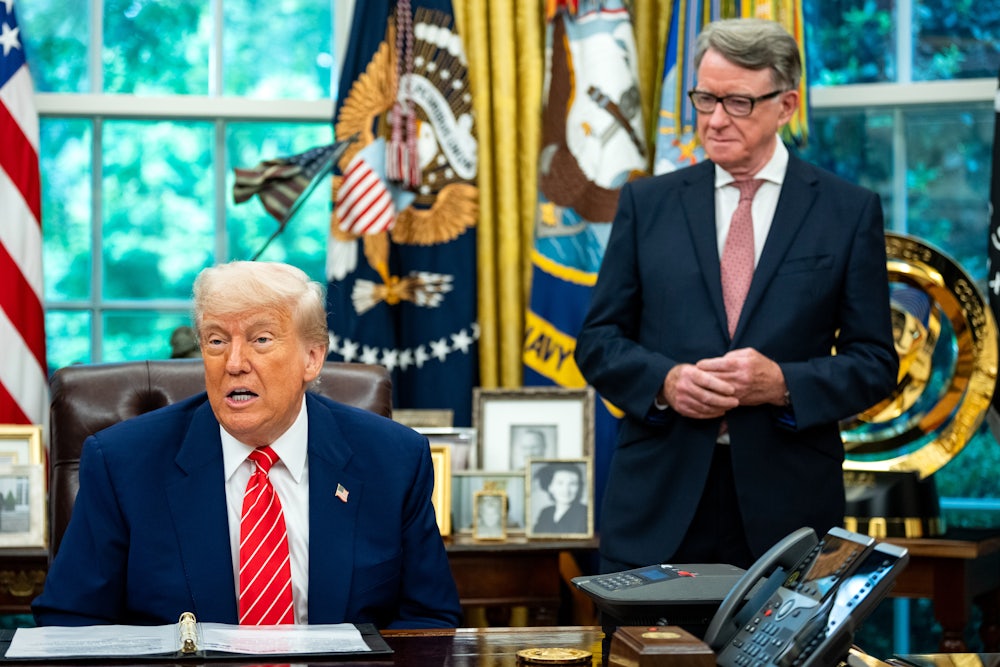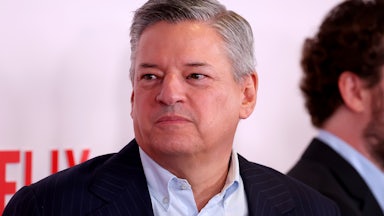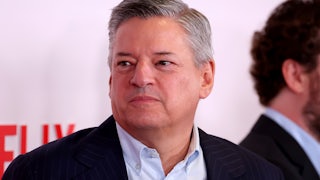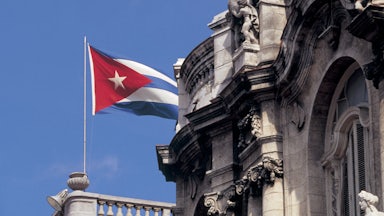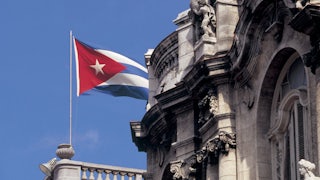Now and again there comes a political perfect storm, when a concatenation of different factors and events spells disaster. This week sees one here in England. It has ended one career, it could yet engulf a prime minister, and it might also enrage a president, with incalculable effects.
In July of last year, the Labour Party led by Sir Keir Starmer won a landslide election, at least in terms of parliamentary seats: His actual support was much more tenuous, barely a third of the popular vote. Since then one problem after another has beset the government, some of them maybe unavoidable but some of them self-inflicted, and in a way that suggests Starmer himself has no real affinity for politics.
One problem in the “unavoidable” category confronted him last November when Donald Trump won the American presidential election and returned to the White House in January. For every country and every government, this presented a question of how to deal with this capricious, ill-tempered, and possibly unbalanced man, who seemed determined to upend the international order, first of all with his astonishing array of new tariffs.
During his previous presidency, Trump had paid a state visit to England and been thrilled to meet Queen Elizabeth II, although there’s good reason to think that she wasn’t quite so thrilled to meet him. Previous presidents have paid such visits to England, but none has ever paid more than one. Then again, no previous president has been a convicted felon, so maybe there has to be a first time for everything.
As if we didn’t know that Trump was quite unlike any president before, good or bad, he began to use his office for a form of ritual humiliation. President Volodymyr Zelenskiy of Ukraine and President Cyril Ramaphosa of South Africa came to Washington and sat in the Oval Office only to be insulted and abused by the president. Starmer persuaded himself that preemptive flattery might work, the grosser the better. And so when it was his turn to sit in the Oval Office, he performed a simply excruciating coup de théâtre, producing a large envelope and then opening it to take out a personal invitation from King Charles III to the president to pay another state visit.
The next step in what looked like a calculated campaign of ingratiation was to find a new British ambassador for Washington. Peter Mandelson has been called one of the most consequential British politicians of the past 40 years. He has also been called “the prince of darkness,” a backstairs schemer, a troublemaker, and a liar. Beginning back in the 1980s, he helped Tony Blair and Gordon Brown reshape the Labour Party to meet the challenge of a long period in opposition, which would be in all 18 years under Tory governments, a role he ascribed to himself without false modesty in the title of his memoir, The Third Man.
He was originally a Brown supporter, but when Labour leader John Smith died suddenly in 1994, Mandelson switched his allegiance to Blair, earning Brown’s hatred. It’s true that between them they changed the Labour Party, but essentially by making it a kinder, gentler version of Thatcherism. Or as Joe Klein, a perceptive visiting American, said at the time of their 1997 landslide election victory, the closer you looked at New Labour, the more it seemed like a neat rhetorical device whose purpose was to allow a group of technocrats to persuade themselves that they had not after all become middle-aged conservatives.
Then began Mandelson’s ministerial career, to call which checkered would be a gross understatement. He was twice hired as a Cabinet minister by Blair and twice fired, on both occasions because of slippery personal conduct. In 1998, he borrowed a large sum from a rich Labour member of parliament to help buy a house without telling anyone. Then Blair brought him back in as Northern Ireland Secretary, where he did a very good job during his brief tenure, before another financial escapade saw him ejected.
But he seemed unsinkable, and in 2004 Blair sent him to Brussels as a European Union commissioner for trade. As he departed, he gave a little farewell gathering for the parliamentary press, which the late and much-missed Simon Hoggart of The Guardian described dryly. At one point Mandelson said, “If I’m honest—and I will be …” to which Hoggart added that he spoke about being honest as if it were rather like golf or gardening, an avocation a man might take up in middle age.
Once again, he did a good job. I know Mandelson slightly, and I’ve always enjoyed his company. He’s clever, he has a certain charm, and he’s sharp-witted and sharp-tongued in conversation. He is also a first-rate administrator, which is why, despite their old enmity, Brown brought him back into government in 2008, and why staff at the Business Department actually applauded him as he arrived.
And yet those administrative skills, and his intelligence, were allied to personal failings, above all his incurable adoration of the rich and powerful. While he was doing his European job, he was found to have been a guest aboard the yacht of Paul Allen, the co-founder of Microsoft, which was part of an important EU investigation at the time. Then it was a cruise on another yacht, owned by the controversial Italian businessman Diego della Valle, and a holiday on one more yacht, owned by Oleg Deripska, a Russian oligarch, as they are euphemistically known. Really, Mandelson could almost have written a book on yachting as a pastime.
Once he reached Washington last fall, he began schmoozing Trump with almost exaggerated sycophancy. Over and over he praised the president, and we back here cringed as we watched their love-ins, with Trump saying how good-looking Mandelson was, and, “I love that accent.” He said the same about Starmer’s accent, which is even odder. Accent can be a fraught matter in England, where it’s too often a badge of class, but what strikes us here about Starmer’s voice is not that it’s high-class or low-class but that it’s distressingly adenoidal. In my view all this was not only just distasteful but pointless. Trump enjoys egregious flattery, but he doesn’t respond to it. You can lick his boots, and he’ll still kick you in the teeth.
But it was a rich American who was to be Mandelson’s nemesis. It is impossible to be ironic or restrained about his appalling friendship with Jeffrey Epstein, or about the way he was less than candid on the subject when lobbying for the Washington job. We now know that he cozied up with Epstein as much as he could and wrote “my best pal” adoring notes even after his first conviction for sex crimes, when he urged Epstein to appeal.
Last Wednesday, Starmer stubbornly defended Mandelson in the House of Commons, and then the following day, when more details emerged, he fired him. He now says that on the Wednesday, he knew about Mandelson’s emails to Epstein but not about their full content, which, as feeble excuses go, ranks with Mandelson’s saying that, as a gay man, he wouldn’t have known about Epstein’s romping with young girls (that’s not just feeble but emetic).
All of this reflects very badly on Starmer’s judgment. But it adds an extra piquancy to Trump’s visit. It’s bad enough that the British ambassador to Washington, who was to have played an important part in the visit, has gone. But the name Epstein that brought the ambassador down is one that Trump very much does not want to hear, for good reason of his own. No doubt King Charles will do his duty and welcome his visitor, as his late mother Queen Elizabeth gritted her teeth and welcomed other visitors from Nicolae Ceaușescu to Robert Mugabe. But there’s again reason to think that the king did not appreciate Starmer’s decision to invite Trump, or admire Mandelson’s flattery of the president beyond the call of duty.
It’s notable how brief this visit is, and that it seems to be taking place almost entirely in private. Trump arrives on Tuesday and goes on to Windsor Castle, where on Wednesday he will drive in a carriage shielded by many police. He will then attend a state banquet, also at Windsor and not, as is usual, at Buckingham Palace, before flying home on Thursday.
He won’t show his face in London, which is just as well given his unpopularity here, with 73 percent of British people saying they dislike and distrust him. On Wednesday, a huge demonstration against him in London is planned. The marchers will include Sir Max Hastings, military historian and former editor of the Tory Daily Telegraph, who has rightly said that “this will be a visit not inspired by affection or respect on the part of the hosts, but by fear—apprehension about what this president is capable of doing.”
All this came at a point when Starmer really didn’t need another crisis, the last gale-force wind in his perfect storm. Only the other week, Starmer defended Angela Rayner, his deputy prime minister, until he couldn’t any longer and she went, after it was discovered that she underpaid taxes on an apartment she owned near Brighton. And as I write, Paul Ovenden, Starmer’s director of strategy at Downing Street, was forced to resign when sexually vulgar emails he sent years ago about Diane Abbott, a left-wing M.P., were revealed. You wonder whether people will ever learn that nothing in cyberspace is secret.
Never the most charismatic or beguiling of leaders, Starmer’s selling points were meant to be efficiency and competence. Swaying through this storm, he looks more vulnerable than ever, and Labour M.P.s are beginning to talk openly about how long he can last. Very few would bet that he would still be prime minister by the time of the next general election.
There’s a further twist in this convoluted plot, which in some ways is the story of the final moral disintegration of New Labour so many years after Mandelson helped to launch it. The New York Times has published a detailed investigation into Epstein’s links with JP Morgan, which continued to serve him as a client after his first conviction, overlooking the way that he was withdrawing hundreds of thousands of dollars in cash, doubtless used to pay off victims.
In 2007, Blair did something no one had ever done before in British political history. He resigned as prime minister, and left Parliament on the very same day. On occasion in the past a premier would resign and go immediately to the House of Lords, as the Conservative Stanley Baldwin did in 1937, but more often they would hang on in the Commons—for more than 20 years after he left Downing Street, in David Lloyd George’s case, and for nine poignant years in Winston Churchill’s, unable to face leaving the place even though he was in his silent dotage. More recently, the Tories’ Edward Heath sat sulking bitterly in the Commons for more than 25 years after Margaret Thatcher deposed him.
And on more or less the same day that he left British politics, Blair signed up as an adviser—or more likely a name to put on the letterhead—with JP Morgan, for a couple of million a year, or so it was surmised. Blair has never revealed the extent of the money he has made since leaving office, and he had created a system of private companies designed to minimize both taxation and transparency, so successfully that they’ve defeated investigation by the most experienced London financial journalists.
In an unseemly display of self-pity, Mandelson has described Epstein as an albatross around his neck. There is another hanging there. In 1998, in perhaps the most famous words he ever uttered, which have been quoted against him ever since, he said that “New Labour is totally relaxed about people becoming filthy rich.” Little did we know when he said that how he and his friends would put those words into practice. Little did he know how his love of the rich would catch up with him in the end.
As Alan Bennett has nicely put it, Blair seemed to regard the premiership as a booster rocket on his ascent to financial greatness, and we’ve grown inured to the way our politicians turn public office into private profit. But then again, maybe that’s what gives some of them a sense of affinity with Donald Trump, a true master of that art.
But the more disturbing thing this dinner will now highlight, in the wake of Mandelson’s resignation, is that Trump shares with the former ambassador a careless taste in friends. Jeffrey Epstein did much terrible harm in his lifetime. It’s somehow fitting that he now comes back from the grave to haunt so many, from Peter Mandelson to JP Morgan to Donald Trump.
